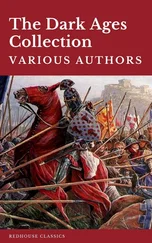. § 4. Attila’s Invasions of Gaul and Italy, and the Fall of the Hun Empire (A.D. 450-454)
If the western provinces of the Empire had hitherto escaped the depredations of the Huns, this was mainly due to the personality and policy of Aetius, who had always kept on friendly terms with the rulers. But a curious incident happened, when Attila was at the height of his power, which diverted his rapacity from the east to the west, and filled his imagination with a new vision of power.
Of the court of Valentinian, of his private life, of his relations to his wife and to his mother we know no details. We have seen that he was intellectually and morally feeble, as unfitted for the duties of the throne as had been his uncles Honorius and Arcadius. But his sister Justa Grata Honoria had inherited from her mother some of the qualities we should expect to find in a granddaughter of Theodosius and a great-granddaughter of the first Valentinian. Like Placidia, she was a woman of ambition and selfwill, and she had inherited the temperament of her father which chafed against conventionality. We saw that she had been elevated to the rank of an Augusta probably about the same time that the Imperial title had been conferred on her brother. 43During her girlhood and until Valentinian’s marriage her position in the court was important, but when her nieces were born she had the chagrin of realising that henceforward from a political and dynastic point of view she would have to play an obscure part. She would not be allowed to marry except a thoroughly safe man who could be relied upon to entertain no designs upon the throne. We can understand that it must have irked a woman of her character to see the power in the hands of her brother, immeasurably inferior to herself in brain and energy; she probably felt herself quite as capable of conducting affairs of state as her mother had proved herself to be. We can divine that she was a thorn in the side of Valentinian, but we are given no glimpse into the domestic drama played in the Palaces of Ravenna and Rome.
She had passed the age of thirty when her discontent issued in action. She had a separate establishment of her own, within the precincts of the Palace, and a comptroller or steward to manage it. His name was Eugenius, and with him she had an amorous intrigue in A.D. 449. 44She may have been in love with him, but love was subsidiary to the motive of ambition. She designed him to be her instrument in a plot to overthrow her detested brother. The intrigue was discovered, 45and her paramour was put to death. She was herself driven from the Palace, and betrothed compulsorily to a certain Flavius Bassus Herculanus, a rich senator of excellent character, whose sobriety assured the Emperor that a dangerous wife would be unable to draw him into revolutionary schemes. 46
The idea of this union was hateful to Honoria and she bitterly resented the compulsion. She must often have heard — she had perhaps been old enough to have some recollection herself — of the breach between her mother and her uncle after her father’s death. In that crisis of her life Placidia had turned for help to a barbarian power. Her daughter now decided to do likewise. She despatched by the hands of a trustworthy eunuch, Hyacinthus, her ring and a sum of money to Attila, asking him to come to her assistance and prevent the hateful marriage. Attila was the most powerful monarch in Europe and she boldly chose him to be her champion.
The proposal of the Augusta Honoria was welcome to Attila, and was to determine his policy for the next three years. The message probably reached him in the spring of A.D. 450. She had sent her ring to show that the message was genuine, but he interpreted, or chose to interpret, it as a proposal of marriage. He claimed her as his bride, and demanded that half the territory over which Valentinian ruled should be surrendered to her. 47At the same time he made preparations to invade the western provinces. He addressed his demand to the senior Emperor, Theodosius, and Theodosius immediately wrote to Valentinian advising him to hand over Honoria to the Hun. Valentinian was furious. Hyacinthus was tortured, to reveal all the details of his mistress’s treason, and then beheaded. Placidia had much to do to prevail upon her son to spare his sister’s life. When Attila heard how she had been treated, he sent an embassy to Ravenna to protest; the lady, he said, had done no wrong, she was affianced to him, and he would come to enforce her right to a share in the Empire. Attila longed to extend his sway to the shores of the Atlantic, and he would now be able to pretend that Gaul was the portion of Honoria.
Meanwhile Theodosius had died and we saw how Marcian refused to pay the annual tribute to the Huns. This determined attitude may have helped to decide Attila to turn his arms against the weak realm of Valentinian instead of renewing his attacks upon exhausted Illyrian lands which he had so often wasted. There was another consideration which urged him to a Gallic campaign. The King of the Vandals had sent many gifts to the King of the Huns and used all his craft to stir him up against the Visigoths. Gaiseric feared the vengeance of Theoderic for the shameful treatment of his daughter, 48and longed to destroy or weaken the Visigothic nation. We are told by a contemporary writer, who was well informed concerning the diplomatic intrigues at the Hun court, that Attila invaded Gaul “to oblige Gaiseric.” 49But that was only one of his motives. Attila was too wary to unveil his intentions. It was his object to guard against the possibility of the co-operation of the Goths and Romans and he pretended to be friendly to both. He wrote to Tolosa that his expedition was aimed against the enemies of the Goths, and to Ravenna that he proposed to smite the foes of Rome. 50
Early in A.D. 451 51he set forth with a large army composed not only of his own Huns, but of the forces of all his German subjects. Prominent among these were the Gepids, from the mountains of Dacia, under their king Ardaric, and the Ostrogoths under their three chieftains, Walamir, Theodemir, and Widimir; 52the Rugians from the regions of the Upper Theiss; the Scirians from Galicia; the Heruls from the shores of the Euxine; the Thuringians; 53Alans, and others. When they reached the Rhine they were joined by the division of the Burgundians who dwelled to the east of that river and by a portion of the Ripuarian Franks. The army poured into the Belgic provinces, took Metz (April 7), 54captured many other cities, and laid waste the land. It is not clear whether Aetius had really been lulled into security by the letter of Attila disclaiming any intention of attacking Roman territory. Certainly his preparations seem to have been hurried and made at the last moment. The troops which he was able to muster were inadequate to meet the huge army of the invader. The federate Salian Franks, some of the Ripuarians, the federate Burgundians of Savoy, and the Celts of Armorica obeyed his summons. 55But the chance of safety and victory depended on securing the co-operation of the Visigoths, who had decided to remain neutral. Avitus, whom we have already met as a persona grata at the court of Tolosa, was chosen by Aetius to undertake the mission of persuading Theoderic. He was successful; but it has been questioned whether his success was due so much to his diplomatic arts as to the fact that Attila was already turning his face towards the Loire. 56There was a settlement of Alans 57in the neighbourhood of Valence, and their king had secretly agreed to help Attila to the possession of that city. The objective then of Attila was Orleans, and the first strategic aim of the hastily cemented arrangement between the Romans and Goths was to prevent him from reaching it. The accounts of what happened are contradictory. 58The truth seems to be that the forces of the allies — the mixed army of Aetius, and the Visigothic host under Theoderic, who was accompanied by his son Thorismud — reached the city before the Huns arrived, and Attila saw that he would only court disaster if he attempted to assault their strongly fortified camp. No course was open but retreat. Aetius had won a bloodless strategic victory (summer A.D. 451). 59
Читать дальше












